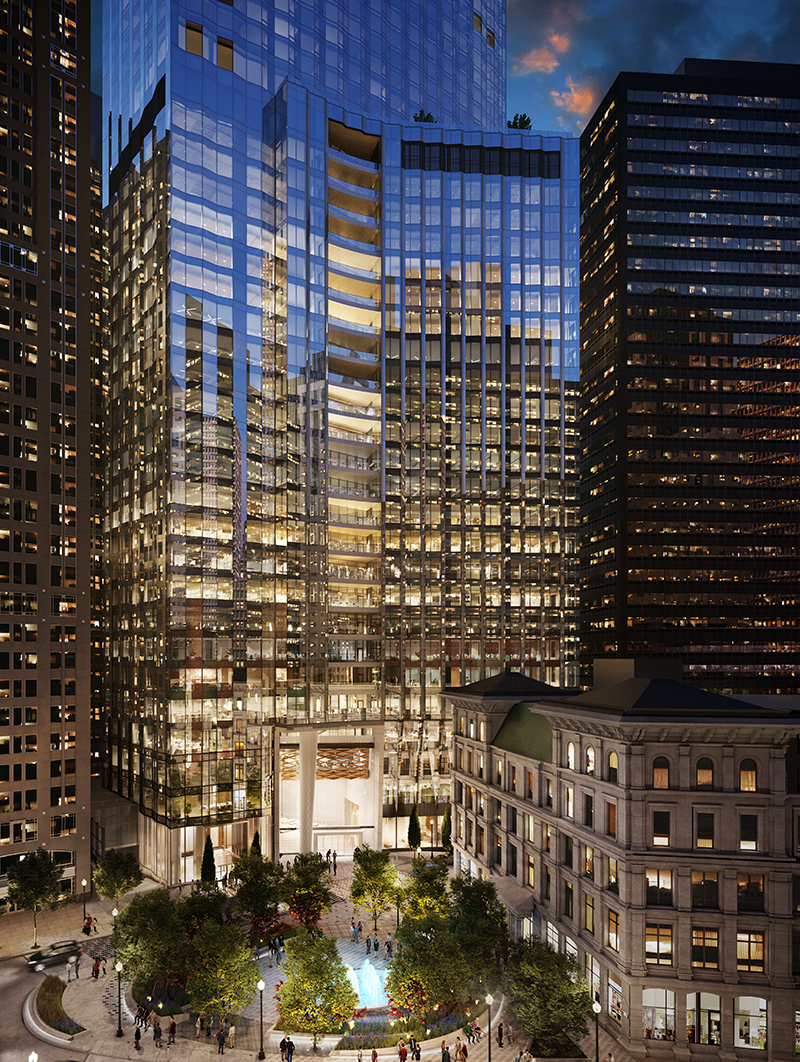
Millennium Partners secures $775 million construction loan from Cale Street Investments for Winthrop Center

Boston, MA Millennium Partners Boston has secured a $775 million construction loan from real estate investment and finance firm Cale Street Investments for Winthrop Center, the 691-foot, $1.3 billion development coming to the city. Steps ahead of others racing to integrate health and wellness features into buildings in response to COVID-19, Winthrop Center has prioritized elevated indoor air quality since its initial inception and approval in 2018 and will be built to deliver fresh air on every office floor. Setting the new global standard for integrating health and wellness, sustainability, and technology in building design, Winthrop Center will deliver 812,000 s/f of global class A office space, 572,000 s/f of residential space, including 321 luxury residences, and city’s next great public space upon completion.
Designed by Handel Architects to address not just environmental and sustainability concerns but also the health and productivity of its occupants, Winthrop Center addresses the growing sense of responsibility people have to reduce their carbon footprint, while offering better managed air and other health benefits of Passive House design. The building will achieve LEED Gold certification for its residential portion, LEED Platinum certification and WELL Gold certification, the leading tool for advancing health and well-being in buildings globally for its office space, and become the world’s largest and most advanced Passive House office building.
“Securing the construction loan from Cale Street Investments – an unprecedented investment given the global pandemic – assures that Winthrop Center will remain on schedule for completion in 2022, when it will introduce a new model for office environments and surpass current best-in-class standards,” said Millennium Partners founder Christopher Jeffries. “From its inception, human-centric design, sustainability, and flexible workspaces have formed the foundation of Winthrop Center, and with innovation a core part of Boston’s DNA, the city is the perfect home for this legacy building.”
Fueled by academic research from the city’s great minds, Winthrop Center redefines how cutting-edge urban research, architecture, technology, sustainability and engineering can shape a building and impact the productivity, wellness and social engagement of the people inside it.
Through a partnership with MIT professors led by the director of MIT’s Environmental Solutions Initiative, John Fernandez, the project is well-positioned to meet increased demands for healthier indoor environments, flexibility and comfort, and energy efficiency. Winthrop Center is also poised to leave a lasting legacy, not by its ornamentation or surface detailing, but by the air quality it improves, the energy consumption it reduces, and the social and environmental improvements it issues beyond its property line.
“We are proud to partner with Millennium Partners Boston in support of the development of Winthrop Center,” said Cale Street’s founder Ed Siskind. “For over 25 years, Millennium Partners has had a proven track record for delivering luxury mixed use properties. We believe Winthrop Center will be a market leader in sustainability as the largest Passive House office building in the world.”
Forward-thinking health and wellness aspects were integral to Winthrop Center’s vision and design prior to the onset of COVID-19, which has heightened concerns related to indoor air quality and ventilation. In addition to providing 30-50% more fresh air than comparable buildings, Winthrop Center was designed to provide greater access to natural light, a column-free structural design with unobstructed sight lines, and generous 12-foot ceilings that help tenants achieve clarity of thinking and increased productivity. Winthrop Center’s Passive House building envelope with triple paned windows and healthy material selection works behind the scenes to keep occupants well and healthy, and the design affords opportunities to connect, collaborate, and be inspired, with the Connector, a public-facing gathering space on the ground floor, serving as the living heart of the building.
In addition to delivering a next-gen office space that reflects the utmost in environmental stewardship, sustainability, technology and wellness standards, the vibrant mixed-use tower offers prospective residents the opportunity to live in a legacy building reflecting socially and environmentally conscious values. Winthrop Center residences are designed for an urban Boston lifestyle, with next-gen smart home technology, access to building amenities including world-class mind, body and nutrition services; a residential club featuring a full-service lounge and function room; an immersive social calendar to connect residents with curated city experiences across food, travel, art and culture; and five-star service at all touch points, from valet, door man to concierge and beyond.
Winthrop Center marks another transformational project for Millennium Partners, which is renowned for offerings that in addition to delivering world-class design, architecture, services and amenities, also positively impact communities and create a strong sense of place reflective of the destinations in which users work, play, and live, whether in New York, Washington D.C., San Francisco, Los Angeles, or Boston. Millennium Partners’ deep ties to Boston are evidenced in the thousands of construction and permanent jobs it has created through developments in the region, where it has restored hotels and landmark properties, developed residential, office, retail and entertainment space, and contributed millions of dollars to affordable housing and job training. On the heels of the record-setting development of the nearby Millennium Tower, Burnham Building, and Millennium Place, the construction of Winthrop Center is fueled by Millennium Partner Boston’s commitment to the city and vision for shaping the future of healthy office space and eco-conscious design with a development that will create far reaching and highly positive economic impacts for both the Commonwealth of Massachusetts and the city.